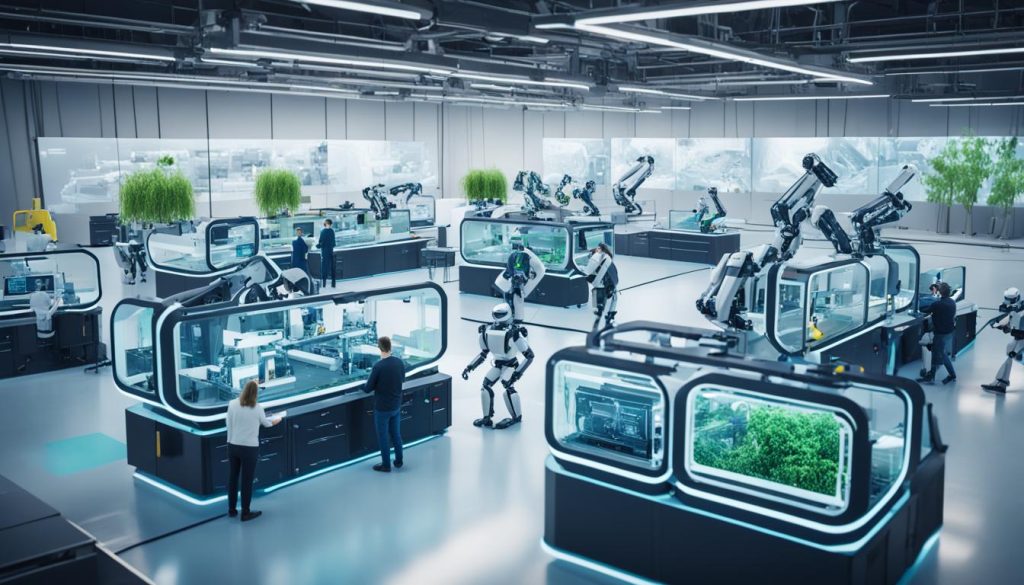The landscape of manufacturing stands on the brink of a transformative era. As industry leaders, your foresight into the Future Skills in Manufacturing is pivotal for navigating the revolution set forth by Industry 4.0. The paradigm shift towards intelligent technology demands a new caliber of Manufacturing Talent Development. Integrating advanced robotics, complex data analytics, and digital literacy into your skillset is not simply innovative—it’s critical to future-proofing your career and contributing to the competitive stamina of your industry.
Within the intricate dance of gears and gigabytes, possessing Industry 4.0 skills sets you apart, equipping you with the proficiency to operate at the intersection of efficiency and innovation. The capability to manage and maneuver through the intricacies of smart manufacturing defines the industry champions of tomorrow.
Key Takeaways
- Understanding the significance of future skills essential for the manufacturing industry’s advancement.
- Identifying core Industry 4.0 skills that elevate your professional relevance and marketability.
- Emphasizing the importance of continual Manufacturing Talent Development to maintain industry competitiveness.
- Recognizing the role of smart technologies and their impact on the future workforce in manufacturing.
- Exploring strategic approaches to learning and mastering new, indispensable manufacturing competencies.
Embracing Industry 4.0: Key Skills for Modern Manufacturers
As the landscape of manufacturing continues to pulse with technology, advanced manufacturing training becomes not just a tool, but a foundational pillar for those determined to excel. Mastering digital transformation skills is not a luxury—it’s a necessity. Key proficiencies in skills for smart factories, where the digital realm collides with the tactile world, are redesigning the blueprint of modern industry competencies.
The integration of artificial intelligence (AI), robotics, and machine learning represents a trifecta of capabilities central to the modern manufacturer. In this vein, understanding and deploying these technologies effectively can radically transform production efficiency and output quality. To ensure you are not left trailing on the path to digitization, a rigorous skills enhancement program is vital. Let’s delve into the specifics that will buttress your future in this brave new manufacturing era.
- Advanced Robotics: Programming, operation, and maintenance of robotic systems.
- Machine Learning Algorithms: Implementing AI that can predict, adjust, and enhance manufacturing processes.
- Data Analytics: Harnessing data for strategic decision-making and optimization of manufacturing operations.
- 3D Printing: Using additive manufacturing for prototyping and production.
- Internet of Things (IoT): Deploying interconnected devices for real-time monitoring and control.
| Area of Expertise | Skills Acquired | Benefits in Smart Factories |
|---|---|---|
| Robotics | Robot calibration, troubleshooting, machine vision integration | Increased precision and productivity in production lines |
| Data Management | Data mining, visualization, predictive modeling | Better forecasting and responsive supply chain management |
| AI & Machine Learning | Natural language processing, neural networks, algorithm optimization | Enhanced automation and real-time quality control |
| IoT Connectivity | Sensor deployment, network security, system integration | Operational efficiency and maintenance prediction |
| Additive Manufacturing | CAD modeling, material knowledge, post-processing techniques | Customization possibilities and reduced material waste |
Moreover, the pursuit of these competencies will guide you towards a more resilient, adaptive approach to manufacturing challenges. Continuous learning and adaptability are non-negotiable, paving the way for a rich culture of innovation. Excellence in advanced manufacturing training prepares you not only to participate but to lead in the era of smart factories.
Fostering an environment that drives progress in digital transformation skills primes you for the ongoing evolution defining Industry 4.0. This transformative journey is not only about adopting new technologies but also manifesting a mindset willing to evolve alongside the restless tides of innovation. Your blueprint for success in this advanced landscape starts with identifying, developing, and mastering the critical skills that will carve out your niche in the future of manufacturing.
Navigating Digital Transformation in Manufacturing
As you forge ahead in the manufacturing industry, the pivot towards digital transformation is not just a milestone—it’s a complete overhaul of your operational DNA. Beyond basic technical skills, your toolkit must now include advanced digital transformation skills, additive manufacturing proficiency, and a thorough understanding of emerging technologies in manufacturing. These competencies are becoming the bedrock upon which companies can build their Industry 4.0 success stories.

Digital Literacy and Data Analysis
The significance of digital literacy has escalated; comprehending and leveraging data analysis is no longer a preferential skill but a stringent requirement. You are expected to grasp the vast streams of data flowing through digital manufacturing systems. This expertise doesn’t just streamline operations but enhances decision-making, giving way to unprecedented levels of efficiency and optimized production outcomes.
Cybersecurity Essentials for Manufacturing
In an era where cyber threats loom large, grasping the essence of cybersecurity essentials has become crucial for safeguarding manufacturing assets. Industry 4.0 technologies have increased the attack surfaces for industrial systems. Your understanding of cybersecurity is a protective shield for your digital transformation journey, minimizing vulnerabilities and establishing a resilient barrier against potential breaches.
Cloud Computing and IoT Integration
The synergy between cloud computing and the Internet of Things (IoT) is revolutionizing the manufacturing landscape. With these skills in your repertoire, you unlock a future of agile, interconnected, and smart ecosystems. This potent combo facilitates real-time data analytics, fosters predictive maintenance, and bolsters productivity—a true game-changer for forward-thinking manufacturers.
Advanced Manufacturing Training for Competitive Edge
To maintain a competitive advantage in today’s fast-paced manufacturing industry, embracing advanced manufacturing training is crucial. Such training cultivates a workforce that can innovate and adapt to the ever-evolving landscape, ensuring that your business remains at the cutting edge of technological advancements.
Adaptive Problem-Solving Techniques
The unpredictable nature of modern manufacturing demands adaptive problem-solving techniques. As you encounter new challenges, the ability to devise effective solutions quickly is invaluable. This skill is integral for manufacturers seeking to optimize production processes and respond efficiently to changes within the industry.

Continuous Learning and Process Improvement
Your journey to excellence is never complete without a commitment to continuous learning and process improvement. This dedication not only boosts your capability to innovate but also ensures sustainable progress through systematic enhancements. Whether it’s refining workflow efficiency or upgrading technology, continuous improvement is the engine that drives long-term success.
Certification in Advanced Manufacturing Technologies
Pursuing a certification in advanced manufacturing technologies solidifies your position as a leading professional in the field. Certifications provide validation of your expertise, particularly in robotics and automation skills, and display your preparedness to leverage these competencies for the betterment of manufacturing outcomes.
Skills for Smart Factories and Automation
As the industrial horizon expands with smart factories, your ability to keep up will hinge on Robotics and Automation Skills. The unparalleled efficiency and precision these technologies offer are transforming manufacturing. To stay relevant in this innovative climate, you’ll need to foster Additive Manufacturing Proficiency. It’s not merely about getting acquainted with new machinery; it’s about understanding the symbiotic relationship between design, material, and machines.
Delving into Emerging Technologies in Manufacturing isn’t simply an exploration; it’s a critical step towards mastery. Whether you’re operating 3D printers or programming robots, the expertise gained now lays the groundwork for the future. The smart factory thrives on interconnectivity and data, making Skills for Smart Factories your ticket to becoming an irreplaceable part of the manufacturing evolution.
| Essential Skill | Relevance | Benefits |
|---|---|---|
| Robotics Programming | Core component of automated processes | Increases production efficiency and accuracy |
| Additive Manufacturing | Revolutionizes product design and prototyping | Reduces waste and speeds up development |
| Machine Learning Applications | Enhances predictive maintenance and anomaly detection | Optimizes operational longevity and safety |
| Data Analysis and Management | Drives informed decision-making | Facilitates customized solutions and improvements |
| System Integration | Vital for seamless smart factory operations | Enables cohesive workflows and data transparency |
To ensure you’re at the cutting edge, consider a blend of practical exposure and theoretical instruction in areas like system integration and data management. This dual focus empowers you to not only operate within the smart factory paradigm but to innovate and push the boundaries of what’s possible. Your journey toward Skills for Smart Factories is more than an individual endeavor; it’s a foundational move for the holistic advancement of the manufacturing industry.
Conclusion
As we contemplate the future of manufacturing, it becomes evident that investing in Manufacturing Talent Development is more than just a prudent decision—it is a competitive necessity. Your capacity to adapt and progress alongside technological innovations is not only beneficial but crucial for long-term success. Understanding and mastering Skills for Smart Factories, including those honed through Advanced Manufacturing Training, positions you to leverage the full potential of Emerging Technologies in Manufacturing.
Staying Ahead with Manufacturing Talent Development
The landscape of manufacturing is constantly being reshaped by technological advancements. In this environment, those who invest in their skills set the pace for the industry. By prioritizing talent development, you ready yourself for the demands of current and future innovations. The objective is clear: to cultivate a workforce that’s proficient, nimble, and aligned with the trajectory of Industry 4.0.
Fostering a Culture of Innovation and Adaptability
Today’s manufacturing sector is a vortex of change and adaptation, where fostering a culture of innovation isn’t merely a strategic choice—it’s a survival mechanism. It’s about investing in the right competencies, encouraging an ethos of lifelong learning, and building resilience through flexibility. By doing so, you ensure that your manufacturing abilities are not just relevant for today’s challenges but are also honed for uncharted futures, fostering an enduring legacy of excellence and innovation.
FAQ
What are the most critical future skills in manufacturing with the advent of industry 4.0?
Key skills for future success in manufacturing include data analytics, digital literacy, advanced robotics proficiency, and an understanding of smart manufacturing technologies. As Industry 4.0 brings forth connected environments, having the ability to analyze and leverage data will be integral. Additionally, skills in cyber-physical systems, the Internet of Things (IoT), and cloud computing are increasingly important for creating efficient, intelligent factories.
Why is advanced manufacturing training essential for modern manufacturers?
Advanced manufacturing training is essential because it equips you with the knowledge and skills needed to operate, manage, and innovate within smart factory settings. As technology progresses, having cutting-edge digital transformation skills ensures you remain competitive and can contribute to the optimization of manufacturing processes. Training helps bridge the skills gap and prepares you for the integration of robotics, AI, and machine learning into production systems.
How significant is digital literacy and data analysis in manufacturing?
Digital literacy and data analysis are now fundamental for decision-making and operational efficiency in manufacturing. With volumes of data generated through connected devices and systems, the ability to interpret and use this data is crucial for enhancing product quality, process optimization, and predictive maintenance. It offers insights that can lead to significant cost savings and improved productivity.
What cybersecurity skills are needed in the manufacturing industry?
Industry 4.0 technologies bring cybersecurity to the forefront within the manufacturing sector. Understanding potential threats, implementing secure protocols, and staying informed of the latest cybersecurity practices is essential for protecting intellectual property, sensitive data, and critical infrastructure from cyber-attacks. Skills in risk assessment and the ability to develop and enforce security policies are also valuable.
Why are cloud computing and IoT integration skills important in manufacturing?
Cloud computing and IoT integration skills are pivotal for manufacturing as they enable the connection and communication between machines, systems, and devices across the production floor. Proficiency in these areas allows for the real-time monitoring and analysis of operations, leading to improvements in efficiency, scalability, and the advent of predictive maintenance – all critical components of a modern, connected manufacturing environment.
What advantages do adaptive problem-solving skills provide to manufacturers?
Adaptive problem-solving skills allow you to quickly and effectively respond to changes and challenges in dynamic manufacturing environments. As modern manufacturing involves complex, automated processes, the ability to adapt to new scenarios, troubleshoot systems, and innovate solutions is invaluable for maintaining continuity and improving operational performance.
How does continuous learning and process improvement impact manufacturing workers?
Continuous learning and a commitment to process improvement are critical for personal and organizational growth within manufacturing. This mindset promotes ongoing skill development and the adoption of best practices, ensuring that both workers and the company they work for stay at the leading edge of manufacturing technologies and methodologies.
What is the importance of certifications in advanced manufacturing technologies?
Certifications in advanced manufacturing technologies validate your expertise and showcase your dedication to professional growth. They are a testament to your competency in robotics, automation, and other Industry 4.0 technologies, making you a more attractive candidate for employers looking to innovate and improve production efficiency.
Why are skills in robotics and additive manufacturing proficiency becoming increasingly important in manufacturing?
Robotics and additive manufacturing are at the forefront of the shift towards advanced production techniques. Skills in these areas prepare workers for the implementation and maintenance of automated processes and the creation of complex components through 3D printing. This proficiency supports the efficiency, customization, and scalability that smart factories demand.







